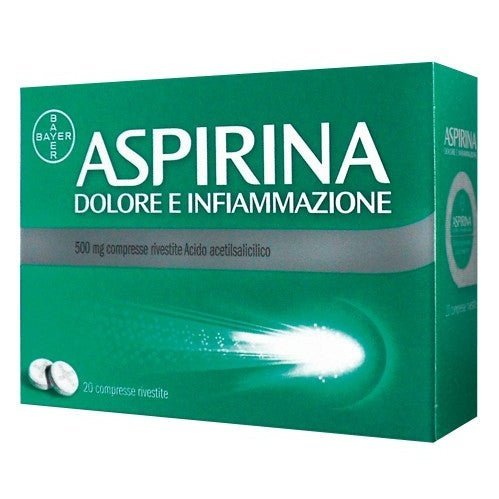
Aspirin Pain and Inflammation is a drug based on acetylsalicylic acid (500 mg per tablet) indicated for the symptomatic treatment of mild and moderate pain, as well as to reduce inflammatory conditions. Thanks to its analgesic, anti-inflammatory and antipyretic properties, Aspirin is effective in reducing muscle pain, headache, toothache and in controlling fever.
ACTIVE INGREDIENTS
Active ingredients contained in Aspirin Pain Inflammation 20 Tablets 500 mg - What is the active ingredient of Aspirin Pain Inflammation 20 Tablets 500 mg?
Each tablet contains 500 mg of acetylsalicylic acid. Excipients with known effect: One coated tablet contains 3.12 mmol (or 71.7 mg) of sodium. For the full list of excipients, see section 6.1.
EXCIPIENTS
Composition of Aspirin Pain Inflammation 20 Tablets 500 mg - What does Aspirin Pain Inflammation 20 Tablets 500 mg contain?
Tablet core: colloidal silicon dioxide, sodium carbonate. Coating: carnauba wax, hypromellose, zinc stearate.
DIRECTIONS
Therapeutic indications Aspirin Pain Inflammation 20 Tablets 500 mg - Why is Aspirin Pain Inflammation 20 Tablets 500 mg used? What is it used for?
Symptomatic treatment of fever and/or mild to moderate pain, such as headache, flu-like syndrome, toothache, muscle aches.
CONTRAINDICATIONS
Contraindications Aspirin Pain Inflammation 20 Tablets 500 mg - When should Aspirin Pain Inflammation 20 Tablets 500 mg not be used?
/SECONDARY EFFECTS Hypersensitivity to acetylsalicylic acid or other salicylates, or to any of the excipients listed in section 6.1; history of asthma or hypersensitivity reactions (e.g. urticaria, angioedema, severe rhinitis, shock) induced by the administration of salicylates or substances with a similar action, in particular non-steroidal anti-inflammatory drugs (NSAIDs); active peptic ulcer; haemorrhagic diathesis; severe renal insufficiency (GFR < 30 ml/min/ 1.73 m^2); severe hepatic insufficiency; severe uncontrolled cardiac insufficiency; concomitant administration of methotrexate in doses greater than 15 mg per week, for anti-inflammatory doses of acetylsalicylic acid, or for analgesic or antipyretic doses (see section 4.5); concomitant administration of oral anticoagulants for anti-inflammatory doses of acetylsalicylic acid, or for analgesic or antipyretic doses and in patients with a history of gastroduodenal ulcers (see section 4.5); from the beginning of the sixth month of pregnancy (beyond the twenty-fourth week of amenorrhea) (see section 4.6); children and adolescents under 16 years of age.
DOSAGE
Quantity and method of taking Aspirin Pain Inflammation 20 Tablets 500 mg - How to take Aspirin Pain Inflammation 20 Tablets 500 mg?
Dosage. Adults and children (16 years and older): 1 to 2 tablets for each dose to be repeated as needed after a minimum period of 4 hours. The maximum daily dose must not exceed 6 tablets. Elderly (65 years and older): 1 tablet for each dose to be repeated as needed after a minimum period of 4 hours. The maximum daily dose must not exceed 4 tablets. Acetylsalicylic acid should not be taken for more than 3 days (in case of fever) or 3 - 4 days (in case of pain) unless otherwise indicated by the doctor. Paediatric population: Acetylsalicylic acid should not be used in children and children under 16 years without a medical prescription. Acetylsalicylic acid should be used with caution in patients with abnormal liver or kidney function or with circulatory problems. Method of administration: for oral use. The tablets should be taken with an adequate amount of water. To open the strip, tear from the edge in any position.
CONSERVATION
Storage Aspirin Pain Inflammation 20 Tablets 500 mg - How do you store Aspirin Pain Inflammation 20 Tablets 500 mg?
Do not store above 30 degrees C. Store in the original package to protect from light and moisture.
WARNINGS
Warnings Aspirin Pain Inflammation 20 Tablets 500 mg - About Aspirin Pain Inflammation 20 Tablets 500 mg it is important to know that:
In case of combination with other medicinal products, to avoid any risk of overdose, check that acetylsalicylic acid is not in the composition of these other medicinal products. Reye's syndrome, a very rare and potentially fatal disease, has been described in children with symptoms of viral infections (especially chickenpox and flu-like episodes) with or without taking acetylsalicylic acid. Consequently, acetylsalicylic acid should be administered to children in these conditions only after medical advice and when other measures have proven ineffective. In case of persistent vomiting, altered state of consciousness or abnormal behaviour, treatment with acetylsalicylic acid should be stopped. In case of prolonged administration of high dose analgesics, the headache attack should not be treated with higher doses. Regular use of analgesics, especially a combination of analgesics, may lead to permanent kidney damage, with risk of kidney failure. The medicinal product should be used with particular caution in the following cases: patients with mild to moderate renal impairment (GFR >= 30 to < 90 ml/min/ 1.73 m^2) or patients with impaired cardiovascular circulation (e.g. renal vascular disease, congestive heart failure, volume depletion, major surgery, sepsis or major haemorrhagic events) since acetylsalicylic acid may further increase the risk of renal impairment and acute renal failure. In some severe forms of G6PD deficiency, high doses of acetylsalicylic acid may cause haemolysis. In case of G6PD deficiency, acetylsalicylic acid should be administered under medical supervision. Treatment monitoring should be intensified in the following cases: in patients with a history of gastric or duodenal ulcer, gastrointestinal bleeding, or gastritis; in patients with renal insufficiency; in patients with hepatic insufficiency; in patients with asthma: the occurrence of an asthma attack, in some patients, may be linked to an allergy to nonsteroidal anti-inflammatory drugs or to acetylsalicylic acid; in this case, this medicinal product is contraindicated (see section 4.3); in patients with metrorrhagia or menorrhagia (risk of an increase in the volume and duration of the cycle). Gastrointestinal bleeding or ulcers/perforations may occur at any time during treatment, without necessarily having any warning signs or medical history in the patient. The relative risk increases in elderly subjects, in subjects with low body weight, and in patients receiving anticoagulants or platelet aggregation inhibitors (see section 4.5). In case of gastrointestinal bleeding, treatment must be stopped immediately. Given the inhibitory effect of acetylsalicylic acid on platelet aggregation, which occurs even at very low doses and persists for several days, the patient should be aware of the risk of haemorrhage in case of surgical interventions, even minor ones (e.g. tooth extraction). In analgesic or antipyretic doses, acetylsalicylic acid inhibits the excretion of uric acid; in doses used in rheumatology (anti-inflammatory doses), acetylsalicylic acid has a uricosuric effect. The use of this medicinal product is not recommended during breastfeeding (see section 4.6). The administration of acetylsalicylic acid is not recommended with: oral anticoagulants with analgesic or antipyretic doses of acetylsalicylic acid (>=500 mg per administration and/or < 3 g per day) and in patients without a history of gastro-duodenal ulcers (see section 4.5); other nonsteroidal anti-inflammatory drugs (NSAIDs) with anti-inflammatory doses of acetylsalicylic acid (>= 1 g per administration and/or >=3 g per day) or with analgesic or antipyretic doses of acetylsalicylic acid (>=500 mg per administration and/or < 3 g per day) (see section 4.5). Low molecular weight heparins (and related molecules) and unfractionated heparins with therapeutic doses or in elderly patients (>65 years) regardless of the heparin dose, and for anti-inflammatory doses of acetylsalicylic acid (>= 1 g per administration and/or >= 3 g per day) or with analgesic or antipyretic doses of acetylsalicylic acid (>=500 mg per administration and/or < 3 g per day) (see section 4.5). Clopidogrel (beyond the approved indications for this combination in patients with acute coronary disease) (see section 4.5). Ticlopidine (see section 4.5); uricosurics (see section 4.5); glucocorticoids (except hydrocortisone replacement therapy) for anti-inflammatory doses of acetylsalicylic acid (>= 1g per administration and/or >= 3g per day) (see section 4.5); pemetrexed in patients with mild to moderately reduced renal function (creatinine clearance between 45 ml/min and 80 ml/min) (see section 4.5); anagrelide: increased risk of haemorrhage and decreased antithrombotic effect (see section 4.5). Important information about some of the excipients This medicinal product contains 71.7 mg sodium per dose equivalent to 3.6% of the WHO recommended maximum daily intake of 2 g sodium for an adult.
INTERACTIONS
Interactions Aspirin Pain Inflammation 20 Tablets 500 mg - Which medicines or foods can modify the effect of Aspirin Pain Inflammation 20 Tablets 500 mg?'
In the following text, the following definitions apply: Anti-inflammatory doses of acetylsalicylic acid are defined as "">= 1g per administration and/or >= 3g per day"". Analgesic or antipyretic doses of acetylsalicylic acid are defined as "">=500 mg per administration and/or < 3 g per day"" Several substances give rise to interactions, due to their properties of platelet aggregation inhibitors: abciximab, acetylsalicylic acid, cilostazol, clopidogrel, epoprostenol, eptifibatide, iloprost, iloprost trometamol, prasugrel, ticlopidine, tirofiban, ticagrelor. The risk of bleeding increases with the use of multiple platelet aggregation inhibitors as well as with their use in combination with heparin or related molecules, oral anticoagulants or other thrombolytics, and must be assessed through constant clinical monitoring. Contraindicated combinations (see section 4.3): Methotrexate in doses greater than 15 mg per week, with anti-inflammatory doses of acetylsalicylic acid, or with analgesic or antipyretic doses of acetylsalicylic acid: increased toxicity of methotrexate, in particular haematological toxicity (due to reduced renal elimination of methotrexate caused by acetylsalicylic acid). Oral anticoagulants with anti-inflammatory doses of acetylsalicylic acid, or with analgesic or antipyretic doses of acetylsalicylic acid and in patients with a history of gastroduodenal ulcers: increased risk of haemorrhage. Combinations not recommended: Oral anticoagulants with analgesic or antipyretic doses of acetylsalicylic acid and in patients without a history of gastroduodenal ulcers: increased risk of haemorrhage. Other nonsteroidal anti-inflammatory drugs (NSAIDs) with anti-inflammatory doses of acetylsalicylic acid, or with analgesic or antipyretic doses of acetylsalicylic acid: increased risk of gastrointestinal ulcers and haemorrhage. Low molecular weight heparins (and related molecules) and unfractionated heparins at curative doses, or in elderly patients (>=65 years) regardless of the heparin dose, and for anti-inflammatory doses of acetylsalicylic acid or analgesic or antipyretic doses of acetylsalicylic acid: increased risk of haemorrhage (inhibition of platelet aggregation and aggression of the gastroduodenal mucosa by acetylsalicylic acid). Another anti-inflammatory drug, or another analgesic or antipyretic should be used. Clopidogrel (outside the approved indication for this combination in patients with acute coronary syndrome): increased risk of haemorrhage. If concomitant administration cannot be avoided, clinical monitoring is recommended. Ticlopidine: increased risk of haemorrhage. If concomitant administration cannot be avoided, clinical monitoring is recommended. Uricosurics (benzbromarone, probenecid): decreased uricosuric effect due to competition for uric acid elimination in the renal tubules. Glucocorticoids (excluding hydrocortisone replacement therapy) for anti-inflammatory doses of acetylsalicylic acid: increased risk of haemorrhage. Pemetrexed in patients with mild to moderate renal impairment (creatinine clearance between 45 ml/min and 80 ml/min); increased risk of pemetrexed toxicity (due to decreased renal elimination of pemetrexed caused by acetylsalicylic acid) anti-inflammatory doses of acetylsalicylic acid. Anagrelide: Increased risk of haemorrhage and decreased antithrombotic effect. If concomitant administration cannot be avoided, clinical monitoring is recommended. Combinations requiring precautions for use: diuretics, angiotensin converting enzyme (ACE) inhibitors and angiotensin II receptor antagonists, with anti-inflammatory doses of acetylsalicylic acid or with analgesic or antipyretic doses of acetylsalicylic acid: Acute renal failure may occur in dehydrated patients due to a reduction in glomerular filtration rate resulting from decreased synthesis of renal prostaglandins. In addition, there may be a reduction in the antihypertensive effect. Ensure that the patient is hydrated and that renal function is monitored at the start of treatment. Methotrexate in doses <= 15 mg per week, with anti-inflammatory doses of acetylsalicylic acid, or with analgesic or antipyretic doses of acetylsalicylic acid: Increased toxicity of methotrexate, particularly haematological toxicity (due to reduced renal elimination of methotrexate caused by acetylsalicylic acid). Blood counts should be monitored weekly during the first weeks of concomitant administration. Patients with reduced renal function (even mild) and elderly patients should be closely monitored. Clopidogrel (in the approved indication for this combination in patients with acute coronary syndrome): Increased risk of haemorrhage. Clinical monitoring is recommended. Gastrointestinal topical treatments, antacids and activated charcoal: Increased renal excretion of acetylsalicylic acid due to alkalinisation of urine. It is recommended that antacids and topical gastrointestinal treatments be administered at least two hours after acetylsalicylic acid. Pemetrexed in patients with normal renal function: increased risk of pemetrexed toxicity (due to decreased renal elimination of pemetrexed caused by acetylsalicylic acid) with anti-inflammatory doses of acetylsalicylic acid. Renal function should be monitored. Combinations that should be considered: glucocorticoids (excluding hydrocortisone replacement therapy) for analgesic and antipyretic doses of acetylsalicylic acid: increased risk of haemorrhage. Deferasirox: with anti-inflammatory doses of acetylsalicylic acid, or with analgesic or antipyretic doses of acetylsalicylic acid: increased risk of gastrointestinal ulcers and haemorrhage.
SIDE EFFECTS
Like all medicines, Aspirin Pain Inflammation 20 Tablets 500 mg can cause side effects - What are the side effects of Aspirin Pain Inflammation 20 Tablets 500 mg?
Frequencies: Not known (cannot be estimated from the available data). Blood and lymphatic system disorders: Bleeding and tendency to bleed (epistaxis, bleeding gums, purpura, etc.) with increased bleeding time. The risk of bleeding may persist for 4-8 days after stopping acetylsalicylic acid. May cause an increased risk of haemorrhage in case of surgery. Intracranial and gastrointestinal haemorrhages may also occur. Immune system disorders: Hypersensitivity reactions, anaphylactic reactions, asthma, angioedema. Nervous system disorders: Headache, dizziness, sensation of hearing loss, tinnitus, usually indicating an overdose. Intracranial haemorrhage. Gastrointestinal disorders: Abdominal pain. Occult or overt gastrointestinal haemorrhage (haematemesis, melaena, etc.) resulting in iron deficiency anaemia. The risk of bleeding is dose-related. Gastric ulcers and perforations. Intestinal diaphragm disease (especially in long-term treatment). Renal and urinary disorders: renal impairment and acute kidney injury have been reported. Hepatobiliary disorders: elevated liver enzymes usually reversible with discontinuation of treatment, liver damage, mainly hepatocellular in nature. Skin and subcutaneous tissue disorders: urticaria, rash. General disorders: Reye's syndrome (see section 4.4). Reporting of adverse reactions It is important to report adverse reactions after authorisation of the medicinal product. This allows continued monitoring of the risk-benefit ratio of the medicinal product. Healthcare professionals are asked to report any suspected adverse reactions via the website: https://www.aifa.gov.it/content/segnalazioni-reazioni-avverse.
PREGNANCY AND BREASTFEEDING
If you are pregnant or breast-feeding, think you may be pregnant or are planning to have a baby, ask your doctor for advice before taking Aspirin Pain Inflammation 20 Tablets 500 mg
Inflammation 20 Tablets 500 mg Pregnancy: Inhibition of prostaglandin synthesis may adversely affect the course of pregnancy and/or embryo-foetal development. Data from epidemiological studies suggest an increased risk of miscarriage, cardiac malformations and gastroschisis following the use of prostaglandin synthesis inhibitors in early pregnancy. The absolute risk of cardiovascular malformations is increased from not less than 1% to approximately 1.5%. The risk appears to increase with dose and duration of treatment. In animals, administration of a prostaglandin synthesis inhibitor has been shown to result in increased pre- and post-implantation loss and embryo-foetal mortality. In addition, an increased incidence of various malformations, including cardiovascular, has been reported in animals given a prostaglandin synthesis inhibitor during the organogenetic period of gestation. From the twentieth week of pregnancy onwards, the use of acetylsalicylic acid may cause oligohydramnios resulting from fetal renal dysfunction. This condition may be encountered soon after the start of treatment and is usually reversible upon discontinuation of treatment. In addition, cases of constriction of the ductus arteriosus have been reported following treatment in the second trimester, most of which resolved after discontinuation of treatment. Therefore, during the first 24 weeks of amenorrhea, acetylsalicylic acid should not be administered unless clearly necessary. If acetylsalicylic acid is used by a woman planning a pregnancy, or during the first 24 weeks of amenorrhea, the lowest possible dose should be used for the shortest possible duration. Following exposure to acetylsalicylic acid for several days from the 20th week of gestation onwards, antenatal monitoring for oligohydramnios and constriction of the ductus arteriosus should be considered. If oligohydramnios or constriction of the ductus arteriosus occurs, treatment with acetylsalicylic acid should be discontinued. Beyond the 24th week of amenorrhea, all prostaglandin synthesis inhibitors may expose the fetus to: cardiopulmonary toxicity (premature constriction/closure of the ductus arteriosus and pulmonary hypertension); renal dysfunction (see above); in the final phase of pregnancy, the mother and the neonate may experience: prolongation of bleeding time, due to inhibition of platelet aggregation which may occur even at very low doses of acetylsalicylic acid; inhibition of uterine contractions resulting in delay or prolongation of labor. Consequently, acetylsalicylic acid is contraindicated after the 5th month of pregnancy (over 24 weeks of amenorrhea) (see section 4.3). Breastfeeding. Acetylsalicylic acid passes into breast milk: therefore the use of acetylsalicylic acid is not recommended during breastfeeding (see section 4.4). Fertility: There is some evidence that drugs that inhibit cyclooxygenase/prostaglandin synthesis may cause impairment of female fertility due to an effect on ovulation. This effect is reversible upon discontinuation of treatment.

























